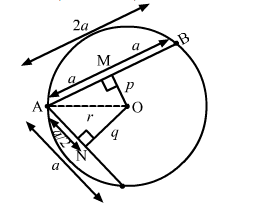$A B$ and $A C$ are two chords of a circle of radius $r$ such that $A B=2 A C$. If $p$ and $q$ are the distances of $A B$ and $A C$ from the centre then prove that $4 q^{2}=p^{2}+3 r^{2}$.
Let AC = a.
Since, AB = 2AC, ∴ AB = 2a.

From centre O, perpendicular is drawn to the chords AB and AC at points M and N, respectively.
It is given that OM = p and ON = q.
We know that perpendicular drawn from the centre to the chord, bisects the chord.
∴ AM = MB = a ...(1)
and $A N=N C=\frac{a}{2}$ ...(2)
In ∆OAN,
$(A N)^{2}+(N O)^{2}=(O A)^{2}$ (Pythagoras theorem)
$\Rightarrow\left(\frac{a}{2}\right)^{2}+(q)^{2}=(r)^{2}$
$\Rightarrow \frac{a^{2}}{4}+q^{2}=r^{2}$
$\Rightarrow \frac{a^{2}+4 q^{2}}{4}=r^{2}$
$\Rightarrow a^{2}+4 q^{2}=4 r^{2}$
$\Rightarrow a^{2}=4 r^{2}-4 q^{2} \quad \ldots(3)$
In ∆OAM,
$(A M)^{2}+(M O)^{2}=(O A)^{2} \quad$ (Pythagoras theorem)
$\Rightarrow(a)^{2}+(p)^{2}=(r)^{2}$
$\Rightarrow a^{2}=r^{2}-p^{2} \quad \ldots(4)$
From eq. (3) and (4),
$4 r^{2}-4 q^{2}=r^{2}-p^{2}$
$\Rightarrow 4 r^{2}-r^{2}+p^{2}=4 q^{2}$
$\Rightarrow 3 r^{2}+p^{2}=4 q^{2}$
Hence, $4 q^{2}=p^{2}+3 r^{2}$
